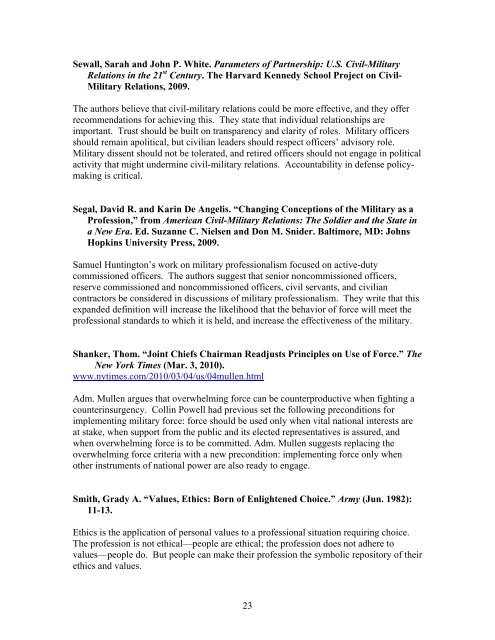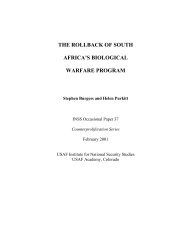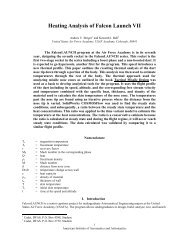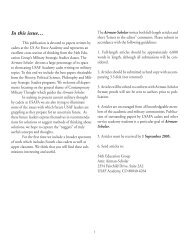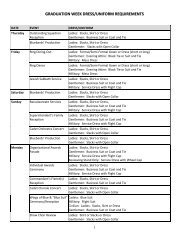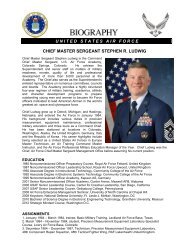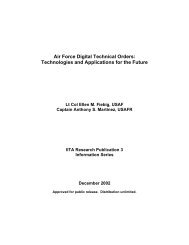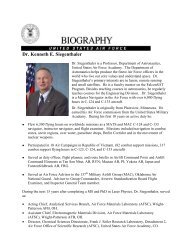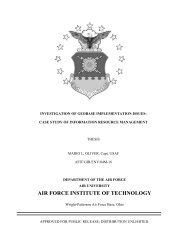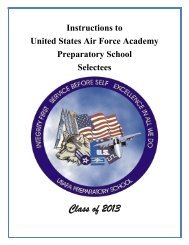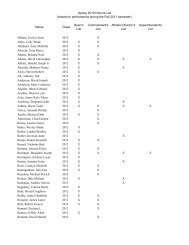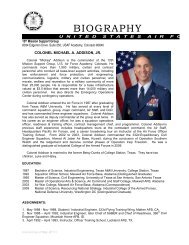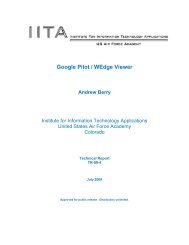Military Professionalism - United States Air Force Academy
Military Professionalism - United States Air Force Academy
Military Professionalism - United States Air Force Academy
You also want an ePaper? Increase the reach of your titles
YUMPU automatically turns print PDFs into web optimized ePapers that Google loves.
Sewall, Sarah and John P. White. Parameters of Partnership: U.S. Civil-<strong>Military</strong><br />
Relations in the 21 st Century. The Harvard Kennedy School Project on Civil-<br />
<strong>Military</strong> Relations, 2009.<br />
The authors believe that civil-military relations could be more effective, and they offer<br />
recommendations for achieving this. They state that individual relationships are<br />
important. Trust should be built on transparency and clarity of roles. <strong>Military</strong> officers<br />
should remain apolitical, but civilian leaders should respect officers’ advisory role.<br />
<strong>Military</strong> dissent should not be tolerated, and retired officers should not engage in political<br />
activity that might undermine civil-military relations. Accountability in defense policymaking<br />
is critical.<br />
Segal, David R. and Karin De Angelis. “Changing Conceptions of the <strong>Military</strong> as a<br />
Profession,” from American Civil-<strong>Military</strong> Relations: The Soldier and the State in<br />
a New Era. Ed. Suzanne C. Nielsen and Don M. Snider. Baltimore, MD: Johns<br />
Hopkins University Press, 2009.<br />
Samuel Huntington’s work on military professionalism focused on active-duty<br />
commissioned officers. The authors suggest that senior noncommissioned officers,<br />
reserve commissioned and noncommissioned officers, civil servants, and civilian<br />
contractors be considered in discussions of military professionalism. They write that this<br />
expanded definition will increase the likelihood that the behavior of force will meet the<br />
professional standards to which it is held, and increase the effectiveness of the military.<br />
Shanker, Thom. “Joint Chiefs Chairman Readjusts Principles on Use of <strong>Force</strong>.” The<br />
New York Times (Mar. 3, 2010).<br />
www.nytimes.com/2010/03/04/us/04mullen.html<br />
Adm. Mullen argues that overwhelming force can be counterproductive when fighting a<br />
counterinsurgency. Collin Powell had previous set the following preconditions for<br />
implementing military force: force should be used only when vital national interests are<br />
at stake, when support from the public and its elected representatives is assured, and<br />
when overwhelming force is to be committed. Adm. Mullen suggests replacing the<br />
overwhelming force criteria with a new precondition: implementing force only when<br />
other instruments of national power are also ready to engage.<br />
Smith, Grady A. “Values, Ethics: Born of Enlightened Choice.” Army (Jun. 1982):<br />
11-13.<br />
Ethics is the application of personal values to a professional situation requiring choice.<br />
The profession is not ethical—people are ethical; the profession does not adhere to<br />
values—people do. But people can make their profession the symbolic repository of their<br />
ethics and values.<br />
23


